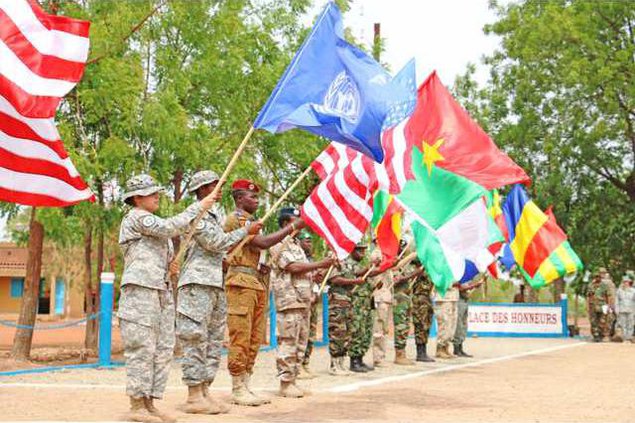Spartan soldiers recently completed a two-week command post exercise called Western Accord 2016 in Burkina Faso, joining 15 West African nations, seven NATO European countries and other U.S. military units in the joint exercise.
Western Accord, which took place from May 2-13, is one of four accord exercises to happen this year in Africa, with 2nd Infantry Brigade Combat Team, 3rd Infantry Division contributing soldiers to them as part of their current mission as regionally aligned forces with United States Army Africa.
U.S. Army Africa is the Army component of United States Africa Command. AFRICOM is a combatant command headquartered in Germany. U.S. Army Africa operates out of Vicenza, Italy.
Other participants at Western Accord were the International Committee of the Red Cross, Economic Community of West African States, and the United Nations.
Soldiers from 9th Engineer Battalion, 2nd IBCT, 3rd ID, helped in the planning and execution of the exercise. Burkina Faso hosted the exercise and wanted it to train its soldiers for an upcoming U.N. peacekeeping mission in Mali.
Soldiers from 9th Engineer Battalion talked to the Coastal Courier in a phone interview May 11 from Burkina Faso about their experience at the accord.
Lt. Col. Michael Biankowski, commander of 9th Engineer Battalion, said the U.S. strategically wants to create long-term partnerships and relationships with African nations.
“They realize that as we can develop relationships and partnerships, we can continue to develop our military in a like fashion,” he said. “And to help build their ability in the long term.”
Maj. Brandon Comrie, the battalion’s executive officer, participated in the sector plans section of the exercise.
Comrie said he was impressed with how quickly the eight participants in his section from different countries came together and worked within each other’s strengths and weaknesses, even though they had just met.
For Comrie, representing some of the planning processes that the U.S. military uses was a way to show different options that can be used.
“Obviously, we want them to use whatever way works best for them,” said Comrie said of the partner nations. “Especially with the different cultures here, we can’t come in and say how you should do it because this is the way we do it.”
Chief Warrant Officer 2 Jeremy Arnold helped plan the exercise for several months. Burkina Faso took the lead in the planning process and “ran with it” and made it a success, he said.
“It definitely has made me a little bit more diverse in dealing with other partner nations,” he said. “It’s been a real positive spin on my career and to realizing that there’s so much more out there.”
Arnold said that “you have your perceptions when you meet someone from a different country,” and he wondered what they thought of the American soldiers. But after working with the other participants, he said, “They’re completely humble, easy to work with. It’s just been a joy the whole time.”
Spc. Mamadou Diallo, who works in supply, was born in Guinea and moved to the United States when he was 12. During the exercise, he worked as a translator and said it has been an honor to help U.S. forces and other nations who speak French.
Diallo never thought that he would be doing something like this in the Army and is interested in becoming an interpreter.
“Being out here definitely opened by eyes to many more opportunities that I could have,” he said.
Command Sgt. Maj. Christopher Gilpin, the command sergeant major of U.S. Army Africa and former command sergeant major of 3rd ID, was also present at the exercise.
The accord provided American soldiers readiness training and the peacekeeping mission scenario was a new learning experience, Gilpin said Tuesday in a Skype interview from Tanzania.
“For our soldiers, that was something that they learned from because we traditionally don’t do peacekeeping missions,” Gilpin said. He added that their African partners also learned from the experiences of American soldiers on how to “execute those type missions.”
The 2nd IBCT was “excellent” at the accord, Gilpin said, adding that Maj. Gen. Darryl Williams, commander of U.S. Army Africa, “was very pleased.”
“We’re very proud to see our soldiers, Marne soldiers, there doing very excellent jobs,” he added.
Participants got more out of the exercise than expected, Gilpin said.
“At the end of the exercise they realized that if they had not come, they would have missed out on a great opportunity,” he said. “So every country that went and participated in that accord left there a better-trained army to execute these missions in the future.”
The 2nd IBCT’s mission as a regionally aligned force is important because it allows for partnerships with armies around the globe so those armies can handle their own issues, according to Gilpin.
“So for the American public, for our families and soldiers back home, it’s important that we do these operations in a time of peace without deploying our soldiers in a time of war,” he said. “So allow our partners to build a capacity to be able to conduct and execute missions by themselves with our help without us sending our soldiers into combat to do it for them.
“So if we have a well-established partnership like we do with our NATO partners, then the enemy, whomever that enemy is, understands that this is a committed alliance and it’s not going to be easily broken,” Gilpin added.

